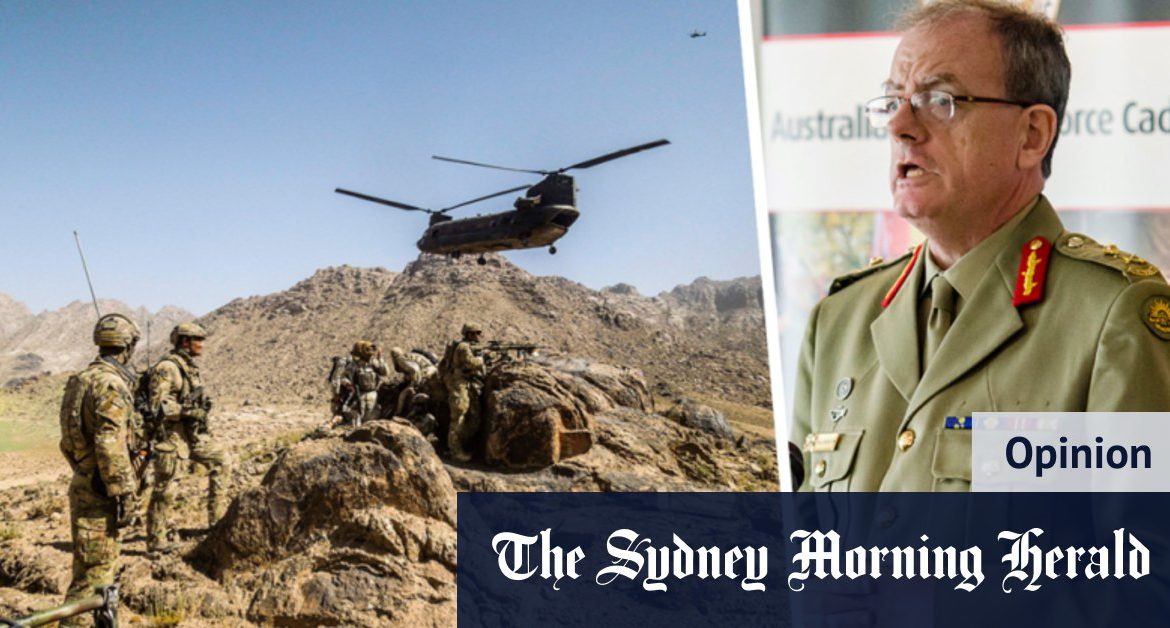Their crimes were first exposed by journalists at this newspaper and at the ABC, who risked defamation actions and AFP harassment to inform the public. The “fog of war” defence cuts no ice. It is difficult not to feel sympathy for troops under lethal pressure and provocation, but the killings described by Brereton were cold-blooded murders – to “blood” new recruits or for target practice on unarmed civilians.
Loading
Only prosecutions will set the kind of precedent that might in future rein in the warrior culture that develops in poorly led troops despatched to a foreign field to fight a war with little purpose and no end in sight. Some whining has come from a few commentators who claim that senior officers should be indicted as well under what they call the “Yamashita rule”. They are mistaken. This refers to the “command responsibility” principle laid down by the US Supreme Court in 1946 when dismissing an appeal by the renowned Japanese general whose troops ran amok in the Philippines at the end of the war.
But this principle does not mean that senior officers are guilty of war crimes committed by their subordinates if they do not know about them – they are only guilty if they refuse to stop them or fail to punish them. Brereton finds no evidence of this, although if any emerges in subsequent proceedings then it might be made the basis of further charges.
Illustration: Andrew DysonCredit:
Problems may come in the future if populist politicians and tabloid media begin to chafe at inevitable delays and take the side of “persecuted” men who after all were “fighting for their country”. This phenomenon has happened in Britain with public pressure building against the prosecution of soldiers who killed civilians in Northern Ireland’s “Bloody Sunday” and who are suspected of war crimes in Iraq. The British government has introduced a bill that will make war crimes harder to prosecute, for example by imposing a time limit of five years which would not be long enough for an investigation like Brereton’s.
Loading
As for America, presidential pardons have already been vouchsafed to several war criminals from the Afghanistan conflict and the example of Lt William Laws Calley still casts its appalling shadow. He was convicted of ordering his troops to “waste” 70 innocent villagers at My Lai in Vietnam and personally shot a two-year-old. He was sentenced to life imprisonment but served only three days before then president Richard Nixon intervened reducing it to three years served in the comfort of his own home.
The US Army did prosecute a few “sadists on the nightshift” who tortured prisoners at Abu Ghraib, but its leaders have displayed a cowardly determination to protect those soldiers from any war crimes investigations in Afghanistan. When the prosecutor of the ICC opened an investigation into compelling evidence that US soldiers had executed prisoners or handed them over to death squads, Trump in revenge signed an executive order banning ICC officials from entering America even to attend the United Nations.
Secretary of State Mike Pompeo, who will soon be a most welcome departure, last month punished ICC prosecutors by freezing their assets in US banks. These irresponsible actions are likely to be reversed by the Biden administration, but they do provide a disgraceful example of how far the US will go to protect its war criminals from justice, compared with Australia’s determination to make them accountable.
We do of course have war criminals in our own past. “Breaker” Morant was executed by the British for killing prisoners in the Boer War, although there is some evidence that their officers egged him on, and his military trial was a travesty. Credible reports of Australian soldiers executing Japanese captives at the end of World War II, in furious revenge for their war crimes and death marches, were not properly investigated.
Loading
But viewers of The Great Escape will recall that the Nazi soldiers who carried out Hitler’s wicked end-of-war order to kill all recaptured prisoners, were put on trial and punished. That must be the fate of SAS suspects, although their trials must be fair, and their legal assistance should not depend on Kerry Stokes. Juries may well acquit some of them, but at least justice – Australian as well as international – will be done. And perhaps – when the process is over – we can salute the real heroes of this sickening story, namely the whistleblowing soldiers who broke the code of silence (ie omerta) and exposed the crimes of their comrades-in-arms.
I know from my own experience of presiding over a war crimes court just how hard it is for witnesses to come forward if threatened with reprisals – especially from “mates”. This takes even more courage than needs to be shown on a battlefield. Each should be given, because they deserve it, an Order of Australia.
Geoffrey Robertson, AO, QC, was president of the UN war crimes court in Sierra Leone.
Geoffrey Robertson is a London-based Australian human rights barrister and author of Rather His Own Man: In Court with Tyrants, Tarts and Troublemarkers.
Most Viewed in National
Loading







